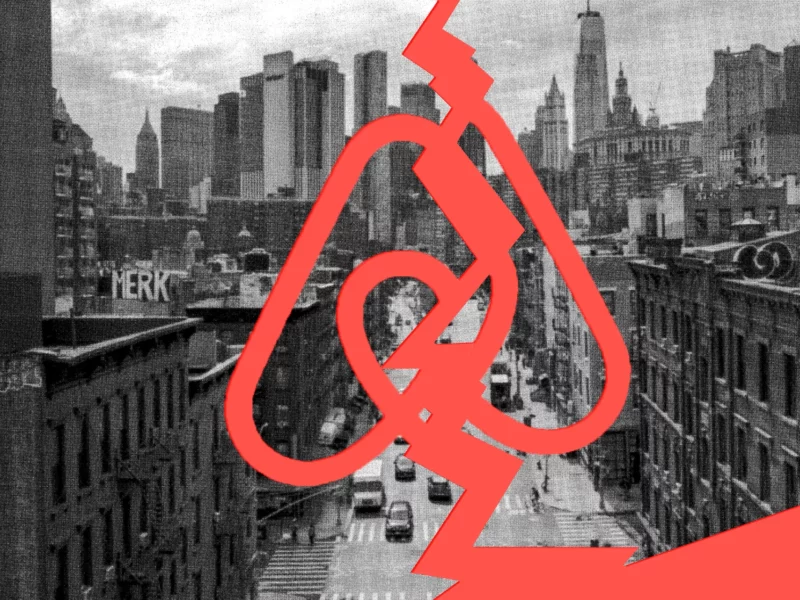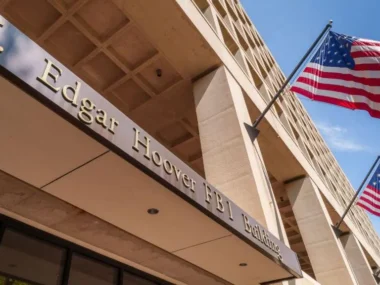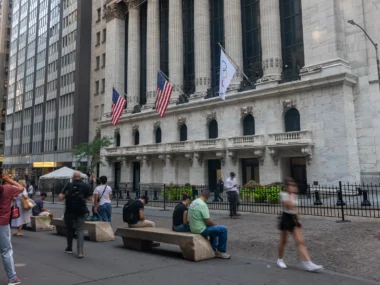As New York City starts enforcing stringent regulations, it is anticipated that numerous Airbnb listings and other short-term rental options will vanish from rental platforms.
Numerous Airbnbs and short-term rentals in New York City are on the verge of disappearing from the scene. The recently enacted Local Law 18 is exceptionally strict, going beyond limiting Airbnb’s operations to nearly banning it for many guests and hosts. Under this law, all short-term rental hosts in New York must register with the city, and only those who both reside in the property they’re renting and are physically present when guests stay can qualify. Furthermore, the number of guests allowed is restricted to two.
This marks the end of an era characterized by stylish downtown apartments tailored for bachelorette parties, cozy two- and three-bedroom units near museums for families, and the option for individuals to rent out their apartments when they’re away for the weekend. While platforms like Airbnb and Vrbo can still function in New York, the regulations are so stringent that Airbnb perceives it as a de facto ban on its business.
Short-term rentals have been associated with issues like noise, litter, and safety concerns, often displacing local residents from their own neighborhoods. While some landlords in New York have a multitude of Airbnb listings, others are New Yorkers seeking to make ends meet, whether by leasing their residences while they’re away or renting out part of a duplex to cover mortgage expenses.
Airbnb is a popular choice for some of the city’s 66 million annual visitors seeking cost-effective and spacious accommodations. In 2022 alone, short-term rental listings generated $85 million in revenue in New York. While New York City represents a relatively small portion of Airbnb’s global market, these new regulations illustrate how local governments can swiftly curtail short-term rentals, mitigating their impact on densely populated residential areas. This trend is not unique to New York, as many cities worldwide grapple with the challenges posed by the short-term rental boom, each taking a distinct approach to regulation.
Various cities are implementing diverse strategies. Dallas, for instance, has confined short-term rentals to specific neighborhoods to prevent disruptive and hazardous gatherings. Elsewhere, places like the Canadian province of Quebec and Memphis, Tennessee, have mandated licenses for short-term rentals. San Francisco limits the duration a residence can be listed on Airbnb to 90 days annually, while Amsterdam and Paris set their limits at 30 and 120 nights per year, respectively. Berlin, at one point, banned almost all Airbnb rentals but later reversed the decision in 2018.
Airbnb’s efforts to challenge these new regulations have thus far been unsuccessful, with a lawsuit against New York City dismissed by a judge who deemed the restrictions “entirely rational.” Airbnb has not indicated whether it plans to appeal the decision. Hosts are actively lobbying for the right to list their apartments as short-term stays and are engaging with city officials in an attempt to change the law to their favor.
The implementation of these rules is a significant blow to New York City’s tourism economy and to the livelihoods of thousands of New Yorkers and small businesses in the outer boroughs who depend on home sharing and tourism income,” says Theo Yedinsky, Airbnb’s global policy director. Yedinsky expresses concerns that the city’s message to potential visitors is one of reduced accommodation options, implying that they are less welcome in New York. He notes that Airbnb has a goal of collaborating with the city to establish sensible home-sharing regulations but does not provide details on the company’s next steps.
The changes are expected to make short-term rentals less appealing for many individuals visiting New York, according to Sean Hennessey, a professor at the New York University Jonathan M. Tisch Center of Hospitality. Given the city’s reputation for small and expensive hotel rooms, these regulations could potentially hinder accessibility to the city.
As of now, there are over 40,000 Airbnbs in New York, with 22,434 categorized as short-term rentals that can be booked for fewer than 30 days, according to Inside Airbnb, a platform that tracks listings. While this number may seem modest compared to New York City’s 8 million population, Murray Cox, the founder of Inside Airbnb, points out that certain desirable neighborhoods are disproportionately burdened by short-term rentals, contributing to housing shortages and higher rents. The new law, theoretically, could address this issue by opening up these homes to local residents. New York City is grappling with a housing shortage that has driven up rents and led to increased homelessness.
The enforcement of this law underscores the effectiveness of reducing short-term rentals, according to Cox, who was part of the Coalition Against Illegal Hotels, a group advocating for the registration law. He believes these regulations can hold platform companies accountable.
Additionally, the new law enables landlords to ban entire buildings from short-term rental platforms, and as of July, nearly 9,000 buildings across New York City were on this list. However, some entire units can still be advertised on rental platforms, as New York’s short-term rental laws exempt specific units that are zoned as hotels and boarding houses.
For small-time hosts like Margenett Moore-Roberts, who rents out a two-bedroom apartment in her Brooklyn brownstone, the law seems to unfairly categorize them alongside professional landlords. Moore-Roberts, who lives in the home’s other unit with her family, values the flexibility of hosting family and friends or using the apartment as a home office. However, because her family does not occupy the second two-bedroom unit, it can no longer be listed on Airbnb for stays of less than 30 days.
The group “Restore Homeowner Autonomy and Rights,” composed of homeowners in New York, is advocating for amendments to the regulations. They are seeking to allow owner-occupied one- and two-family homes to register their units with the city and eliminate capacity limits. Their argument is that homeowners like Moore-Roberts should have the ability to rent out their units and should not be categorized in the same way as larger landlords.
Moore-Roberts expresses that she isn’t entirely opposed to the rule change but believes the law should be revised with more nuance to protect renters with just one property, like herself. She feels that the regulations have been applied broadly when a more precise approach is needed. She mentions that the decrease in income from short-term rentals exacerbates her financial stress, particularly as she is currently out of work. She states, “Putting us all in that same bucket of players is really unfair and not helpful.”
Airbnb has announced its decision to cancel and refund reservations in unregistered accommodations starting from December 2, although reservations made until December 1 will remain unaffected to minimize the impact on hosts and guests. Guests who book and stay in an unregistered rental will not face penalties, but hosts and the platforms they use for advertising could face consequences starting from September 5.
Airbnb also states that unregistered stays were blocked from future bookings beyond September 5 as of August 14. However, a search has revealed that numerous entire apartments for more than two people are still available for booking beyond September 5. These listings appear to not comply with New York’s registration requirements for short-term rentals, but Airbnb did not provide a comment explaining why they are still on the platform. Vrbo declined to comment on the matter, and Booking.com did not respond to requests for comment.
As of August 28, there were 3,250 short-term rental hosts who had submitted registration applications, according to Christian Klossner, the executive director of the Office of Special Enforcement in New York City. Of these, more than 800 applications had been reviewed, resulting in 257 registrations granted, 479 returned for additional information or corrections, and 72 denials. Starting from Tuesday, the office will focus on collaborating with booking platforms to ensure they use the verification system for registrations and do not process unverified transactions.
Despite increasing efforts by numerous cities to regulate Airbnb rentals, the company’s growth continues. In the second quarter of 2023, Airbnb reported earnings of $2.5 billion, an 18 percent increase year-on-year, with the number of nights and experiences booked on the platform rising by 11 percent during the same period.











